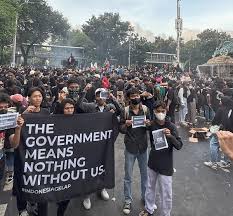
Introduction
In recent weeks, Indonesia has been the scene of widespread protests, driven largely by public discontent over various pressing issues. With its vibrant democracy, Indonesia’s protests highlight the citizens’ demand for accountability and change. As the world’s third-largest democracy grapples with critical governance and environmental challenges, these protests have garnered international attention and concern.
Key Issues Driving Protests
The protests have been largely fuelled by discontent over the government’s policies on several fronts. One primary concern among demonstrators is the controversial Job Creation Law, enacted to attract investment but perceived as undermining workers’ rights and environmental regulations. Labour unions, environmental activists, and student groups have united in their opposition, arguing that the law favours business interests at the expense of labour protections and sustainable development.
Additionally, the Indonesian public has expressed dissatisfaction with rising food prices and the cost of living, aggravated by the global economic climate. Public sentiment is further strained as citizens grapple with issues surrounding corruption within the government and police force, leading to calls for greater transparency and reform.
Events and Responses
Protesters have taken to the streets in major cities including Jakarta and Yogyakarta, demonstrating peacefully but passionately. In response to the unrest, the government has deployed additional police forces to maintain order, resulting in occasional clashes between law enforcement and demonstrators. Human rights organisations have expressed concern about potential violence and the excessive use of force by authorities in some instances.
Notably, the response has been mixed, with some officials acknowledging the need for dialogue while others dismiss the protests as undermining national stability. This division raises further questions about the government’s willingness to address the legitimate concerns of its citizens.
Conclusion
As the protests continue, the implications for Indonesian society and governance may be profound. The government faces significant pressure to engage constructively with the issues raised by citizens, particularly regarding economic inequality and environmental sustainability. Observers speculate that a failure to address these concerns could lead to a profound political shift, potentially redefining Indonesia’s democratic landscape. The ongoing situation serves as a reminder of the critical role of civic engagement in shaping public policy and governance in the world’s largest archipelago.
You may also like

CABA: Understanding Its Relevance in Today’s Context

Franck Ribery: Journey of a Football Icon
